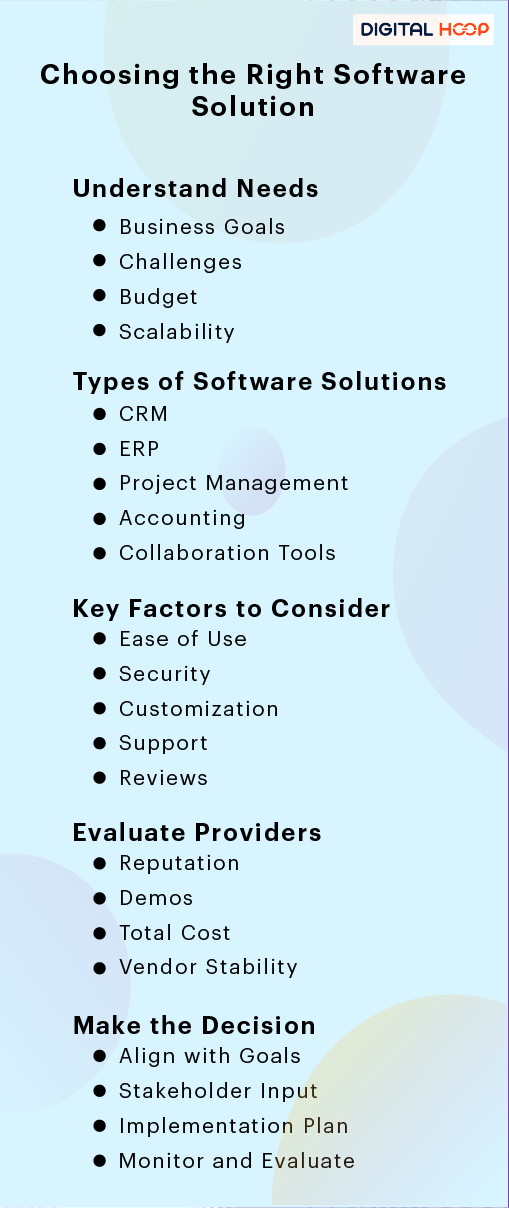In present digital era, choosing the correct software solutions is vital for business growth. Whether you seek tools to streamline operations, boost productivity, or enhance customer engagement, informed software decisions greatly influence success. This blog examines essential factors and steps to aid in selecting the ideal IT solutions tailored to your organization’s requirements.
Understanding Your Business Needs
Before evaluating software options, it’s essential to have a clear understanding of your business requirements. Consider the following aspects:
1. Business Objectives
Identify your business goals and objectives. Are you aiming to increase sales, improve customer service, streamline processes, or expand your market reach?
2. Operational Challenges
Assess the challenges your business faces. This could include inefficient workflows, outdated systems, lack of data security, or difficulties in collaboration.
3. Budget Constraints
Determine your budget for software investment. Consider both upfront costs and ongoing expenses such as subscriptions, maintenance, and training.
4. Scalability
Think about future growth and scalability. Will the software solution accommodate your business as it expands? Ensure scalability to avoid outgrowing the system too quickly.
Types of Software Solutions
There are various types of software solutions available, each catering to different business needs. Common categories include:
1. Customer Relationship Management (CRM) Software
CRM software helps businesses manage interactions with current and potential customers. Key features include contact management, sales pipeline tracking, and customer communication tools.
2. Enterprise Resource Planning (ERP) Software
ERP software integrates core business processes such as finance, HR, inventory management, and supply chain operations into a unified system. It enhances efficiency and data visibility across departments.
3. Project Management Software
Project management tools assist in planning, organizing, and managing projects and tasks. They facilitate collaboration among team members, track progress, and ensure deadlines are met.
4. Accounting Software
Accounting software automates financial processes such as bookkeeping, invoicing, payroll management, and financial reporting. It helps businesses maintain accurate financial records and compliance.
5. Communication and Collaboration Tools
Tools like video conferencing, messaging apps, and collaborative workspace platforms improve team communication and productivity, especially in remote or hybrid work environments.

Key Factors to Consider
1. Ease of Use and Integration
Choose software that is user-friendly and integrates seamlessly with your existing systems. This minimizes disruption and enhances adoption among employees.
2. Security and Compliance
Ensure the software complies with industry regulations (e.g., GDPR, HIPAA) and prioritizes data security. Look for features like encryption, access controls, and regular security updates.
3. Customization and Flexibility
Opt for software that can be customized to suit your specific business processes and workflows. Flexibility allows you to adapt the software as your needs evolve.
4. Support and Training
Evaluate the vendor’s customer support options, including availability, responsiveness, and support channels. Training resources are also essential to ensure your team can effectively use the software.
5. User Feedback and Reviews
Read user reviews and testimonials to understand the software’s strengths, weaknesses, and real-world performance. Pay attention to how the vendor addresses customer concerns.
Evaluating Software Providers in the Market
1. Vendor Reputation
Research the vendor’s reputation within your industry. Look for established providers with a track record of delivering reliable software solutions and excellent customer service.
2. Demo and Trial Periods
Take advantage of demos and trial periods offered by software vendors. This allows you to test the software’s features, functionality, and compatibility with your business operations.
3. Total Cost of Ownership (TCO)
Consider the total cost of ownership beyond the initial purchase price. Factor in implementation costs, ongoing fees, customization expenses, and potential ROI.
4. Long-Term Viability
Assess the vendor’s financial stability and long-term viability. You want a partner who will continue to support and update the software to meet evolving business needs.
Making the Decision for your Business
1. Alignment with Business Goals
Choose software solutions that align closely with your business goals and objectives. Prioritize functionality that directly contributes to achieving strategic outcomes.
2. Stakeholder Buy-In
Involve key stakeholders in the decision-making process. Consider input from department heads, IT professionals, and end-users to ensure buy-in and adoption.
3. Implementation Plan
Develop a clear implementation plan that outlines timelines, responsibilities, and milestones. Allocate resources for training and support to facilitate a smooth transition.
4. Monitoring and Evaluation
Regularly monitor the software’s performance and gather feedback from users. Evaluate its impact on productivity, efficiency, customer satisfaction, and overall business success.
Digital Hoop: Your IT Solutions and SaaS Partner
In conclusion, making the right choice for software solutions involves thinking carefully about what your business needs, how much you can spend, how flexible the software is as your business grows, and what your employees need. By picking tools that make things faster, simplify tasks, and help you grow, you can make your business stronger in a tough market.
Digital Hoop is a dependable partner in giving IT solutions and SaaS applications customized for businesses of all sizes. With a focus on new ideas and making sure customers are happy, Digital Hoop provides:
- Customizable Solutions: Tailored software solutions that meet your unique business requirements.
- Scalable Platforms: Support for business growth with scalable and adaptable software solutions.
- Expert Support: Dedicated customer support and training resources to maximize software utilization.
Partner with Digital Hoop to use advanced technology and advance your business. Get in touch now to see how our IT solutions can strengthen your organization and help you achieve your goals.

